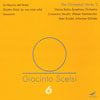Scelsi (La) nascita del verbo; (4) Pezzi; Uaxuctum
More of Scelsi’s explorations into the properties and nature of sound
View record and artist detailsRecord and Artist Details
Composer or Director: Giacinto Scelsi
Genre:
Orchestral
Label: Mode Records
Magazine Review Date: 7/2007
Media Format: CD or Download
Media Runtime: 0
Mastering:
Stereo
DDD
Catalogue Number: MODE176

Tracks:
| Composition | Artist Credit |
|---|---|
| (4) Pezzi |
Giacinto Scelsi, Composer
Giacinto Scelsi, Composer Peter Rundel, Conductor Vienna Radio Symphony Orchestra |
| Uaxuctum |
Giacinto Scelsi, Composer
Concentus Vocalis Giacinto Scelsi, Composer Peter Rundel, Conductor Vienna Radio Symphony Orchestra |
| (La) nascita del verbo |
Giacinto Scelsi, Composer
Giacinto Scelsi, Composer Johannes Kalitzke, Conductor Vienna Chamber Choir Vienna Radio Symphony Orchestra |
Author: Fabrice Fitch
The most substantial piece here is Uaxuctum, scored for a large, idiosyncratic ensemble (including ondes martenot) with chorus. It evokes the legend of “a Mayan city which they themselves destroyed for religious reasons”. Completed in 1966, it was only premiered 21 years later with the composer in attendance, a matter of months before his death. This live recording does it justice, as far as one can tell without the score to hand, and one is only rarely distracted by noises off. Scelsi’s explorations into the physical properties and nature of sound had begun about a decade earlier, following a long period of creative silence. On either side of that hiatus stand the two other works recorded here, first, the cantata La nascità del verbo (“The Birth of the Word”), first performed in 1949, whose title presages a typically Scelsian score. The piece’s opening minutes, before the entry of the choir, give a similar impression, but thereafter, it betrays its indebtedness to Italian music earlier in the century, and a scholasticism that is disconcerting, given the title’s promise. The text is a collection of Latin invocations whose “minimalism” also points, tantalisingly, to his future direction. The Four Pieces (on a single note) of 1959 marked a new beginning, both for Scelsi and for contemporary music. Next to Uaxuctum their range seems a touch restricted, but as studies in radicalism they remain reference-points. The quality of the live performances is remarkable. Anglophone listeners are advised to steer clear of the translation of the introductory text if possible: it is obscure, and often has the opposite meaning to the original French.
Discover the world's largest classical music catalogue with Presto Music.

Gramophone Digital Club
- Digital Edition
- Digital Archive
- Reviews Database
- Full website access
From £8.75 / month
Subscribe
Gramophone Full Club
- Print Edition
- Digital Edition
- Digital Archive
- Reviews Database
- Full website access
From £11.00 / month
Subscribe
If you are a library, university or other organisation that would be interested in an institutional subscription to Gramophone please click here for further information.




